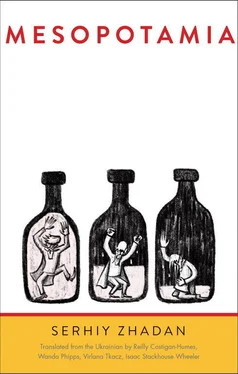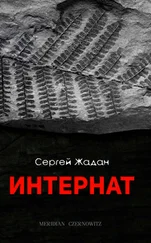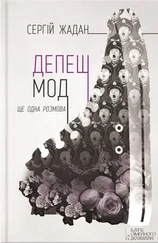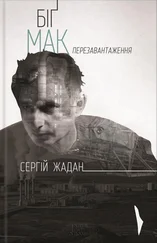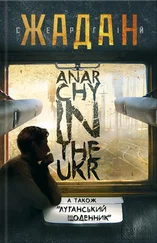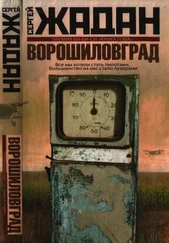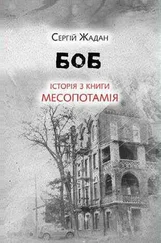“One time in the fall, when he was coming back from sparring, through the park, he came across a man lying there on the ground, his head facing east. A woman who just happened to be passing by saw it all and went on to tell the community. What do most of us do when we see death coming for someone else? Generally, we try not to react at all, hoping we can avoid drawing its attention. We simply pretend that death doesn’t exist, refusing to acknowledge the dead and refusing to think about the living. But Marat stopped—according to the passerby, some inner voice compelled him to bend over the lifeless body. Something hinted to him that all was not lost, that he could try to fend off the dark shadow of death already creeping up on the man from behind the crimson trees. The man was wearing an old-fashioned coat, and his briefcase lay on the ground beside him. He looked like an upstanding guy. Marat acted quickly, instructing the woman to call the police and an ambulance, and while she was dialing the numbers with her cold, stiff fingers, he massaged the poor sap’s heart—he as good as brought him back from the other side. Then he waited around for the ambulance and police, and even drove with them to the station to give a full report. The woman went along, too.”
Alina broke down completely then, tears flowing fast as she bolted out of her seat, heading for the house. But Sasha managed to intercept her, wrapping his arms firmly around her shoulders. She fell into his embrace, giving in to heavy, gasping sobs. We all sat there in silence, sensing that our moment to say something, revive the conversation, keep the unbearable mounting silence from popping like a paper bag was slipping away. Everything was as Kostyk had said, almost—sparring, the park, black trees, and the lilac heavens with red spots out west—that was all true. Marat was just about to quit the team over an argument with the manager; he wouldn’t come home for weeks at a time, and things had gotten so bad with Alina that he wondered why they were still together. That day we’d been bumming around by the park, drinking in a rundown bar—basically just a tent where you could buy beer, really. We were the only ones there, Marat, one of his teammates, and me, just passing the time, waiting for nightfall, and listening to Marat going on about how he was supposedly going to chuck it all and move down to the Caucasus for some coaching job they’d been offering him for years now. In the late afternoon a couple sidled up to the bar—the guy was a lot older than the girl—he looked like a college professor. He was just minding his own business. He was wearing a light fall jacket and glasses; he hardly touched his drink. She was pretty young, but she didn’t appear to be an undergrad—she exuded confidence, ordering her own drink and recommending one for him. Marat went silent and started eyeing her; something about her got to him, resonated with something inside him. She had coarse, fair hair, long, sharp-nailed fingers, and bright white teeth, and since she never stopped laughing or talking, Marat kept examining her smile, not bothering to be the least bit discreet about it. In an hour or so, the professor gave us a look that Marat was determined to take the wrong way. He wanted to throw down, but the bartenders broke it up and told everyone it’d be best if we went on our way. The professor tried to keep his cool, but he handed his girlfriend her coat just a little too quickly, he tipped just a little too generously, and he made just a little too much of a show of taking her hand as they were leaving. We had been restraining Marat, but then he broke free and latched on to her, grabbing her by the arm and pulling her against him. His movements were so sharp and unrestrained that she shrieked, and I wasn’t sure what I was hearing in that shriek—outrage or surprise. It seemed more like surprise to me—and pleasant surprise, at that… although she did try to extricate herself, and she kept up her angry shouting, her teeth shining and her head bobbing, but then she thrust herself forward, crashing into Marat—with bewildered eyes, she studied his sharp, unshaven face, covered in scars and cuts, gray, fiery eyes, black hair, and hard skin. And the longer she looked at him, the more intent her gaze became. When the professor darted toward them to pull her away, Marat lost control, nailing his rival with a right hook like his coaches had taught him when he was a kid; he put his weight into it—and his heart too. The professor rolled across the floor, and the bartenders jumped on Marat from behind. All three of them crashed to the floor too. Marat’s buddy and I tried to throw everyone outside, into the bluish-red void of the eerie park that had devoured the neon fire of the bar’s sign. And there, amid Kharkiv’s golden foliage, Marat pummeled the professor, the bartenders tried pulling him away from his victim, and we did our best to pull them back.
The police took everyone to the station—except the bartenders, of course. The professor was whimpering and calling out for someone to massage his heart before it was too late. His girlfriend was holding a handkerchief up against Marat’s lacerated eyebrow. The professor and his girlfriend were sitting in one corner of the tiny cell, and we were sitting across from them. Nobody said anything; there was nothing but her nervous eyes, fixated on Marat, straining to parse every detail of his face, as though trying to memorize it. Then they were let go, but we had to stay. Marat asked me to use my one phone call on Alina to tell her that he had to report for a meeting with the president of the boxing federation.
“A meeting… at 2 a.m.?” I asked incredulously. “I’m gonna tell her we’re down at the police station. Shit, man, we’ve gotta get outta here somehow!”
“Us at the police station?” Marat seemed hesitant. “She won’t buy it—that’s too believable.”
“Why do we rehash things everyone already knows?” I thought. “Why do we curry favor with the dead by offering stories with so much blood and pain in them? It seems like everyone wants to remember Marat just that way—in red boxer shorts with angel wings on his back and the Lord’s benediction in his warm heart.” I finally decided to leave. I turned toward Sasha. I was about to excuse myself and dissolve into the fog when Alina leaned over toward me and touched my hand wearily.
“Hey, John, can you help me out over here?” she asked.
“Well, obviously, come on,” I answered.
“I shouldn’t even have come,” I thought to myself.
Alina started gathering up the empty bottles scattered in the grass, passing them to me, then she took some dishes and forks off the table and headed inside. I followed, sensing everyone’s eyes and voices behind me; I trod along the cracked bricks, amazed by how smoothly she moved, how deeply she plunged into the night, and how unexpectedly the light from the house’s windows fell on her skin and dark hair. She opened the door and went inside. I went in after her. She took a slow look around her, quietly asked me to leave the bottles in the hallway, and then handed me the forks. They slipped out of my hand and crashed to the floor, sharp and cold like shards of ice. Somewhere deep inside the house, a door creaked. Alina put a finger to her lips, signaling for me to keep it down, since everyone was already asleep. She spoke in a whisper, which gave her voice a peculiarly trusting tone. She opened the door to the living room and took a few cautious steps. The light was off; I didn’t see her so much as sense her—catching the sound of her breath, the slightly sharp walnut scent of her hair, and the slightly jarring creak of the old floorboards under her feet.
“What’s going to happen here in the dark when I accidentally bump into her, when I touch her in the void, when the forks and sharp knives in my hand wound her?” I thought. She passed through the living room and turned down a long hallway, finding her way by touch, her fingers groping from object to object. I knew this house—I played here as a kid. Its strange layout, which had changed a few times over the years, and its rooms cluttered with old furniture and tall cabinets reminded me of Marat, of slightly better circumstances, of the good old days. I’ve always liked the way it smells here—warm, comfortable clothing, wood, and tea. There were no books on the shelves, no pictures on the walls. Cramped rooms, narrow hallways, static shadows, invisible residents. We moved in the darkness, carefully weaving around chairs and bags, planters full of flowers, and shoes scattered across the floor. Suddenly, I realized that I didn’t remember this hallway. It hadn’t been here before, and I should know, I’d been here hundreds of times at different ages and in different states of mind. But I had no memory of this hallway that stretched on and on, gradually narrowing, overflowing with dust and darkness.
Читать дальше
